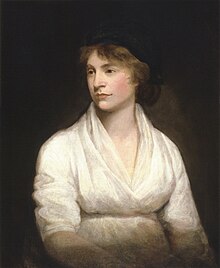30 Blogs of Night: A Person I admire Mary Wollstonecraft

Day 17
Mary Wollstonecraft is one of my heroes, a woman who sought a voice at a time when women didn't have one, a theorist and writer. She penned A Vindication of the Rights of Woman, published in 1792) as an answer to Thomas Payne's Rights of Man, setting out a feminist text before feminism, in the form we know it, actually existed. She wrote at a time when the principles that would become part of the feminist movement were forming, the revolt against Patriarchy, the disestablishment of the very idea of the Divine Right of Kings (which had been largely dispensed of in Britain over a century before, but which clung on in France), and the idea that there were individual rights. While most of this was male focused, to the extent that the American Revolution had lost its fervour for women's rights soon after the founding of the Republic.
She married William Godwin after two affairs, one of which resulted in a daughter, Fanny Imlay, who committed suicide in 1817, only a year after her half sister Mary penned what would become Frankenstein, Wollstonecraft began writing in the 1780s soon after the death of a childhood friend, creating Gothic novels that had a particular focus on the women's status with regards to property, and campaigned in print for better women's rights and education. She spent time in France during the 1790s, arriving only months before the guillotining of Louise XVI and having an affair with an American, Fanny's father. The fall out of that affair was an attempt to commit suicide when she realised he would never love her.
Perhaps because of this, when she did marry Godwin the two lived largely separate lives, They occupied adjoining houses, a living situation that I imagine most couples would be perfectly happy with after the first blush of love. Their happiness was short lived, Wollstonecraft died at the age of 38 of septicemia soon after giving birth to Mary and leaving a legacy of novels, a travel book, a history of the French Revolution, a children's book, and of course A Vindication of the Rights of Women as her legacy.
I admire her because in many ways she was the first feminist, because she stood up for her principles and lived a life in accordance to those principles, at least as much as she could in the time she lived in.
Comments
Post a Comment